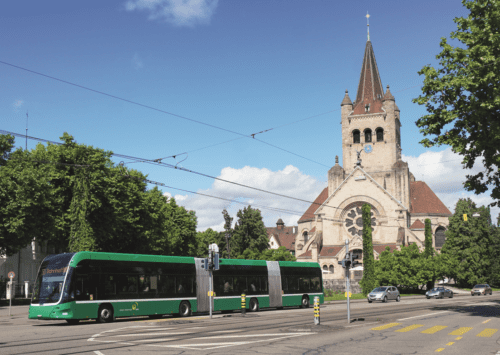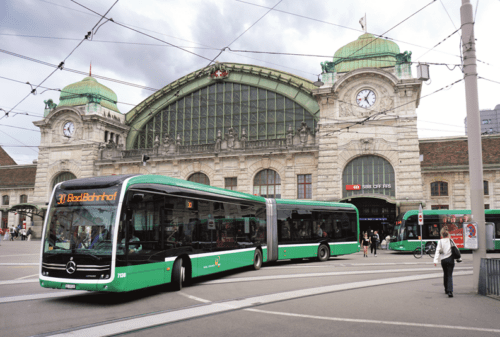
The Swiss border city is investing heavily in electromobility, despite closing its trolleybus system as recently as 2008
Located right on the frontier with both Germany and France, the Swiss border city Basel boasts the world’s only tri-national tramway network, with light rail lines serving all three countries. Even though the city’s complementary trolleybus system was closed in 2008 (after being in operation since 1941), municipal operator BVB now plans to electrify its entire bus network by 2027, although without the use of overhead power lines, reports Andrew Thompson.
The centrepiece of this ambitious agenda is the construction of the all-new electric bus garage at Rank, on the north bank of the River Rhine. Works are expected to commence in 2025 and be completed in time for the target date of 2027. Once complete, the highly customised building will be able to accommodate and charge 144 e-buses on four overground floors. BVB’s first fully electric articulated bus has been in service since 2019, with 65 articulated and non-articulated Mercedes-Benz eCitaro buses entering service in stages in 2022/23.
Another major milestone was the electrification of the busy bus line 50 from Basel SBB railway station to EuroAirport in 2023 through the introduction of eight double-articulated Hess lighTram vehicles. Although several Swiss cities have operated double-articulated Hess trolleybuses for years, Basel was the first to order and deploy the bi-articulated battery-only variant.
As the EuroAirport, which is actually located on French territory at Saint-Louis and also serves the nearby Alsatian city Mulhouse, does not have a railway link, BVB bus line 50 is the primary public transport connection and the launch of the Hess bi-artics has helped increase comfort and capacity. The final stage of Basel bus electrification will take place in 2027, when another 61 electric buses are due for delivery, in time for the opening of the new Rank garage.


